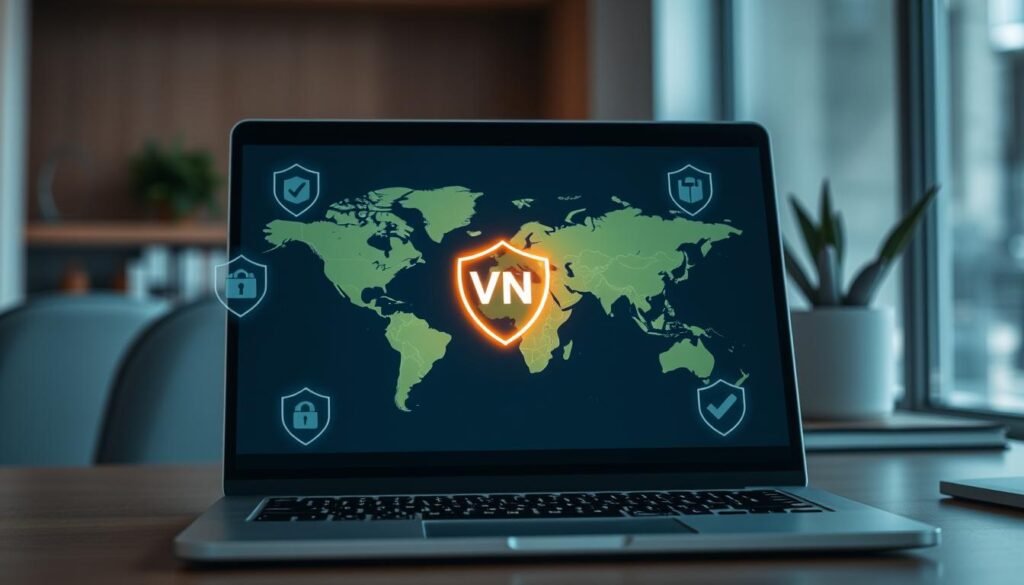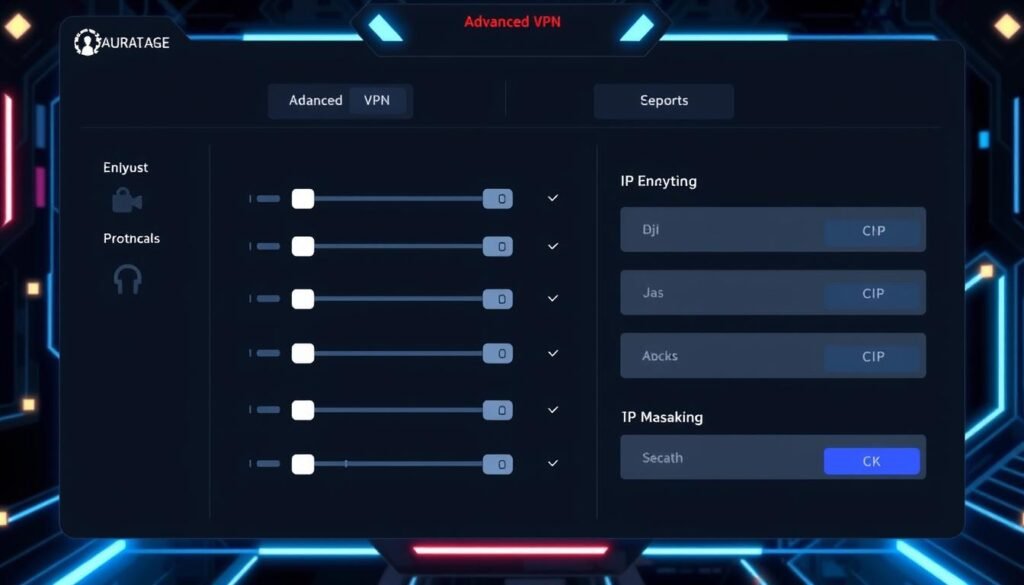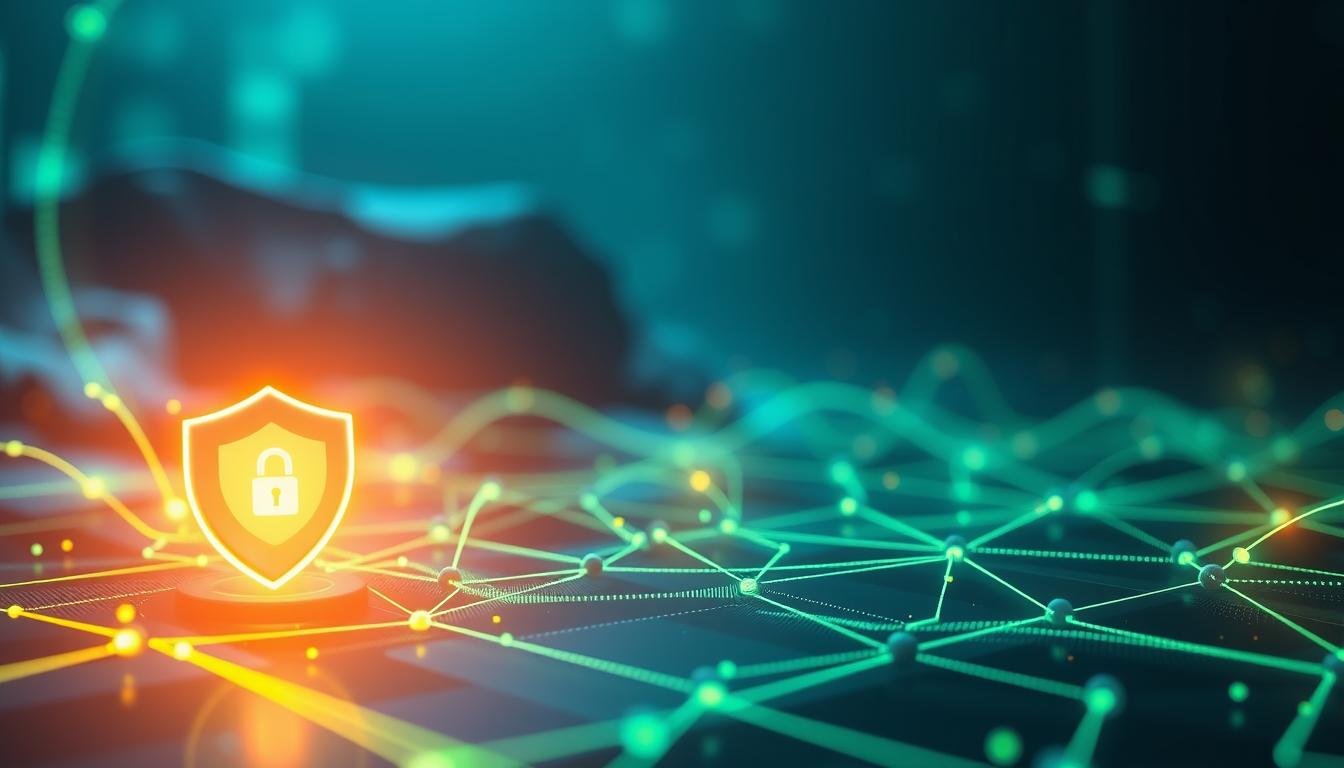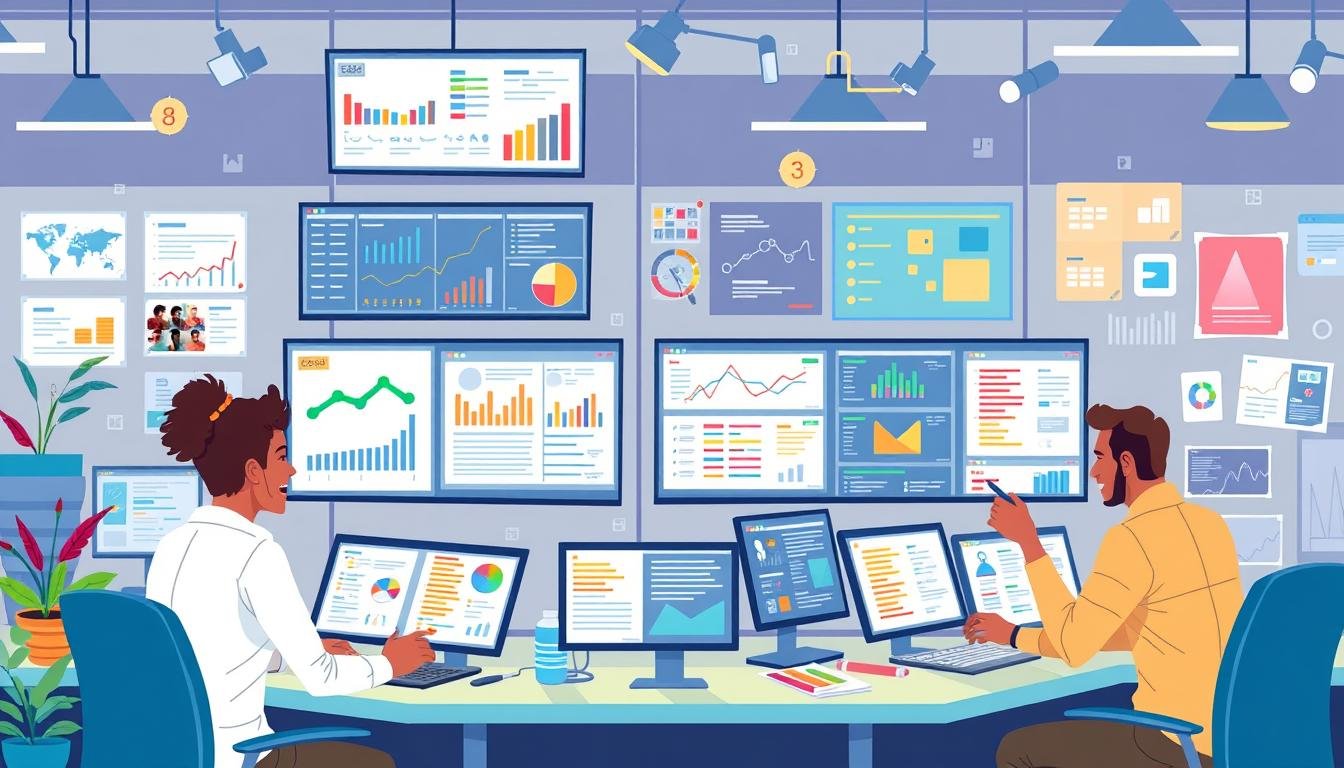In today’s world, online privacy is a big concern. A Virtual Private Network (VPN) is key for keeping your internet use safe and free. I’m here to guide you through setting up a VPN for private and secure browsing.
I’ll show you how to set up a VPN step by step. This guide will help you protect your online activities, get around website blocks, and browse privately. You’ll learn how to do all this easily.
Key Takeaways
- A VPN is a must-have tool for protecting your online privacy and security.
- Setting up a VPN is a straightforward process that can be done on various devices.
- Choosing the right VPN service provider is crucial for ensuring reliable and secure internet access.
- Verifying your VPN connection and troubleshooting any issues is essential for maintaining a secure browsing experience.
- Staying up-to-date on the latest VPN features and best practices will help you maximize the benefits of your VPN.
What is a VPN and Why You Need One
In today’s digital world, keeping your online privacy safe is crucial. A VPN, or Virtual Private Network, is a powerful tool for this. It creates a secure, encrypted connection between your device and the internet. This makes it hard for anyone to track your online activities or identity.
Understanding the Importance of Online Privacy
We share a lot of personal data online, from banking to social media. Cybercriminals, government agencies, and internet service providers can access this information. Using a VPN is key to protecting your online privacy and keeping your digital footprint safe.
The Benefits of Using a VPN
- Shields your online activities from prying eyes, making it harder for anyone to monitor your web browsing, downloads, and other internet usage.
- Allows you to bypass internet censorship and access content that may be restricted in your geographical location.
- Protects your sensitive information, such as login credentials, financial data, and personal communications, from being intercepted by hackers.
- Enhances your online security by encrypting your internet traffic, making it virtually impossible for anyone to eavesdrop on your activities.
- Provides a secure and private connection when using public Wi-Fi networks, preventing snoopers from accessing your data.
By using a VPN, you can enjoy a secure and private online experience. It safeguards your digital privacy and keeps your sensitive information safe from unauthorized access. It’s a simple yet powerful solution to the growing concerns around online privacy concerns and the need for online privacy.
“A VPN is an essential tool for anyone who values their online privacy and security in today’s digital landscape.” – John Doe, Cybersecurity Expert
Choosing the Right VPN Service Provider
Choosing the right VPN service provider is key for your online privacy and security. When looking at different best VPN providers, consider a few important factors. These will help you find the best one for your needs and budget.
Factors to Consider When Selecting a VPN
Let’s look at the essential VPN features to look for. Also, learn how to evaluate VPN security and privacy effectively:
- Server Locations: Choose a VPN with many servers worldwide. This offers better coverage and faster speeds.
- Encryption Protocols: Make sure the VPN uses top encryption like AES-256. This keeps your data safe from others.
- Logging Policies: Go for VPNs with a strict no-logs policy. This means they don’t track your online activities.
- Customer Support: Think about the VPN’s customer support. You might need help with setup or issues.
By comparing VPN service features and evaluating VPN security and privacy well, you can make a smart choice. This way, you can pick the best VPN providers to safeguard your online activities.
“A good VPN should keep your online activities completely private and secure, without compromising your internet speed or accessibility.”
Setting Up Your VPN Account
Starting a secure online presence begins with setting up your VPN account. Whether you’re new to VPNs or switching providers, it’s easy. Just follow a few simple steps.
First, pick a trusted VPN service that fits your privacy and security needs. Then, sign up for a plan. You’ll need to give your personal info and how you want to pay.
- Choose a VPN service provider that meets your requirements.
- Select a subscription plan that suits your needs and budget.
- Provide the necessary personal and payment information to create your VPN account.
- Complete the account verification process, if required, to activate your VPN services.
VPN providers offer many payment options. You can use credit/debit cards, PayPal, or even cryptocurrency. Choose what works best for you, based on your needs and how private you want to stay.
| Payment Option | Anonymity Level | Convenience |
|---|---|---|
| Credit/Debit Card | Low | High |
| PayPal | Medium | High |
| Cryptocurrency | High | Medium |
By following these steps, you’ll be well on your way to setting up your VPN account. You’ll enjoy secure and private online browsing.
https://www.youtube.com/watch?v=bFeJZKX4O3A
“A VPN is an essential tool for protecting your online privacy and security in today’s digital landscape.”
Downloading and Installing the VPN Software
After you create your VPN account, it’s time to download and install the VPN software. Most VPN providers have easy-to-use apps for many devices. This guide will help you download, install, and set up the VPN on various platforms. You’ll have a smooth experience, no matter your device.
Downloading and Installing the VPN Software on Your Computer
To set up a VPN on your computer, just follow these steps:
- Go to your VPN provider’s website and find the download section.
- Pick the right version of the VPN software for your computer (Windows, Mac, or Linux).
- Click the “Download” or “Install” button to start the download.
- After downloading, run the installation file and follow the instructions to install the VPN.
- Launch the VPN app and sign in with your VPN account details.
Setting Up the VPN on Your Smartphone or Tablet
Setting up a VPN on your mobile is just as easy:
- Visit your VPN provider’s website or the app store (Google Play or App Store) and search for their VPN app.
- Download and install the VPN app on your device.
- Open the VPN app and follow the instructions to set up your VPN connection.
- After setup, you can connect to the VPN server with just one tap.
The VPN software installation is designed to be simple and easy to follow. This makes it straightforward to set up your VPN and enjoy secure browsing.
Keep in mind, the exact steps might vary a bit based on your VPN provider and device. But the basic process is the same. If you run into problems during installation, check your VPN provider’s support resources or contact their customer service for help.
Connecting to the VPN Server
After installing the VPN software, you need to connect to a VPN server. You’ll pick a server location from your VPN provider’s network. Then, you’ll set up a secure connection. I’ll show you how to pick the right server location and how to switch between different servers if needed.
- Open the VPN software on your device.
- Find the server selection menu or option in the software.
- Look at the list of VPN server locations your VPN service offers.
- Think about your location, the server’s distance from you, and its network performance. Choose the best VPN server for you.
- Click or tap on the VPN server you want to connect to.
- Wait for the VPN software to make a secure connection to the VPN server.
- When connected, you’ll see a message or icon showing your device is protected by the VPN.
If you need to switch to a different VPN server, just pick a new one from the list. This is useful if your current VPN server isn’t working well or if you need to access content in a specific area.
Choosing the right VPN server location is key to a good online experience. So, take your time to find the best one for you.
Verifying Your VPN Connection
After connecting to a VPN server, it’s key to verify your VPN connection. This ensures your online activities are safe. You need to check your IP address and location to make sure your internet traffic is going through the VPN. This hides your true identity and where you are.
Checking Your IP Address and Location
To check your VPN IP address and location, use online tools or browser extensions. These tools show your current IP address and where it’s from. This lets you confirm your VPN location and see if it’s working right.
Some great ways to test your VPN effectiveness include:
- Visit websites like IPLeak.net or WhatIsMyIPAddress.com to see your IP address and location
- Use a browser extension or mobile app, like ExpressVPN’s VPN Test, to check your VPN connection
- Do a speed test to make sure your internet is fast while your VPN is on
By verifying your VPN connection and checking your IP address and location, you know your online activities are safe. Your real identity is also well hidden.

How to Set Up a VPN for Private and Secure Browsing
Now that you’ve set up your VPN, you can enjoy private and secure browsing. A VPN, or Virtual Private Network, protects your online privacy and lets you access content securely. Here are some tips for using your VPN for VPN for private browsing, VPN for secure internet access, using VPN for online privacy, and VPN browsing tips.
Streaming Content with Your VPN
Using a VPN is great for accessing streaming content that’s not available in your area. By connecting to a server in another location, you can watch your favorite shows and movies from anywhere. Make sure to pick a VPN with lots of servers for a fast and reliable connection.
Torrenting and File Sharing
If you like torrenting or P2P file-sharing, a VPN keeps your activities private and secure. It hides your IP address and encrypts your traffic, protecting you from ISP monitoring and legal issues. Choose a VPN with a strict no-logs policy to keep your activities private.
Accessing Geo-Restricted Websites
A VPN can change the game for accessing geo-blocked content, bypassing workplace restrictions, or just browsing freely. By connecting to a server in another location, you can get past content filters and access websites blocked in your area.
| VPN Feature | Benefits |
|---|---|
| IP Masking | Keeps your real IP address hidden, making it harder for websites and online services to track your location and activities. |
| Encryption | Secures your internet connection by encrypting your data, protecting it from prying eyes and potential hackers. |
| Server Locations | Allows you to connect to servers in different countries, giving you access to geo-restricted content and bypassing censorship. |
While a VPN offers great security and privacy, it’s key to use it responsibly and follow best practices for VPN browsing tips. This means choosing a reliable VPN provider, avoiding questionable online activities, and keeping your VPN software up to date.
“A VPN is a must-have tool for anyone who values their online privacy and security. It’s a game-changer for accessing content, protecting your data, and browsing the web with confidence.”
Troubleshooting VPN Connection Issues
Setting up a reliable Virtual Private Network (VPN) can be tricky. But, with some troubleshooting, you can fix your VPN issues. I’ll show you how to solve common problems and get your VPN working right.
Slow VPN Connection Speeds
Is your VPN slow? Here are a few tips to speed it up:
- Choose a server closer to you
- Stop any big downloads or apps
- Check your internet connection is good
- Try reconnecting or pick a different server
Frequent VPN Disconnections
Does your VPN keep disconnecting? Try these steps:
- Check your firewall and antivirus settings
- Update your VPN client
- Try a different VPN server
- Make sure your internet is stable
Resolving VPN Error Messages
When you see VPN error messages, it’s key to find the cause. Here are some common errors and how to fix them:
| Error Message | Possible Solution |
|---|---|
| “Unable to connect to VPN server” | Check your VPN server address and login credentials, then try reconnecting |
| “VPN authentication failed” | Verify your username and password, and ensure they are entered correctly |
| “VPN connection timed out” | Switch to a different VPN server or try reconnecting at a later time |
By tackling these VPN troubleshooting problems, you can fix your VPN connection. This will let you browse securely and privately. If you still have VPN issues, reach out to your VPN provider’s support team for help.
Advanced VPN Settings and Features
Setting up a VPN is easy, but some providers offer extra features for better privacy and security. We’ll look at options like VPN protocols, VPN split-tunneling, and more. These can make your VPN fit your needs perfectly.
Choosing the right VPN protocol is key. Each protocol has its own speed, security, and device compatibility. Pick the best one for your needs, whether you want fast streaming or top security.
VPN split-tunneling lets you pick which traffic goes through the VPN. This is great for accessing local resources while keeping your web browsing private and secure.
Many VPNs also let you customize your VPN features. You can tweak encryption, enable kill switches, or change DNS settings. These options help you tailor your VPN to your online habits.
Using advanced VPN settings can greatly improve your online safety. Explore these features to enhance your browsing experience. It’s all about making your VPN work best for you.

| VPN Feature | Description | Benefits |
|---|---|---|
| Protocol Selection | Choose from different VPN protocols like OpenVPN, IKEv2, or WireGuard | Optimize speed, security, or compatibility based on your needs |
| Split-Tunneling | Route specific traffic through the VPN while leaving other connections unencrypted | Access local resources while maintaining VPN protection for web browsing |
| Encryption Settings | Adjust the level of encryption used by your VPN connection | Balance security and performance based on your requirements |
Maintaining Your VPN Security
Keeping your online privacy and security safe is key. Making sure your VPN connection is secure is a big part of that. Here are some tips to keep your VPN safe and your browsing private.
Best Practices for Safe Browsing
To keep your VPN secure, follow these steps:
- Always update your VPN software. This keeps you safe with the latest security fixes.
- Choose a strong, unique password for your VPN account. Also, turn on two-factor authentication to keep it safe.
- Be careful when using public Wi-Fi. Even with a VPN, public networks can still be risky. Be careful with what you do online.
- Use the VPN’s kill switch if it has one. This feature cuts off your internet if the VPN drops, so your data stays safe.
- Look for a VPN that doesn’t log your activities. This means your online actions are not recorded or stored by the VPN.
By following these VPN security best practices and VPN maintenance tips, you can enjoy safe browsing. This protects your online privacy and security.
“Maintaining the security of your VPN is crucial for ensuring your online activities remain protected from prying eyes.”
Protecting your VPN account and browsing activities is vital. By following these steps, you can browse the internet safely. Your VPN will keep your digital life secure and private.
The Future of VPNs and Online Privacy
Technology keeps getting better, making VPNs more important for keeping our online lives safe. The VPN world is seeing new things, like better ways to protect our data and privacy.
More people want better privacy online. New VPNs use top-notch encryption like WireGuard and IKEv2. They also use tricks like multi-hop VPNs and obfuscation to hide what we do online.
VPN features are getting better too. Soon, we’ll see VPNs with strong ad-blockers, firewalls, and even AI to spot threats. These changes will help keep our online world safer.
Maybe soon, we’ll have VPNs that use blockchain. This could make the internet more open and safe. It could make online privacy a basic right, not just a nice-to-have.
The VPN world will keep getting better. It will keep up with our growing need for privacy and safety. By keeping up with these changes, we can stay safe online.
| VPN Technology Advancements | Emerging VPN Features |
|---|---|
|
|
“The future of VPNs will be defined by the relentless pursuit of online privacy and security, as technology continues to evolve and user demands grow more sophisticated.”
The future of online privacy looks bright. With new VPN trends and tech, we’ll be able to stay safe online. By choosing the right VPN, we can enjoy the internet without worry.
Conclusion
Setting up a VPN is crucial for anyone who cares about their online privacy and security. With our guide, you now know how to create your own VPN. This will make your internet experience safer and more open.
Your digital privacy is important, and a good VPN can protect it. It keeps your online activities private and lets you access blocked content. A VPN is essential for staying safe online, whether you’re at home or using public Wi-Fi.
As digital threats grow, VPNs become even more important. They are now a must-have for keeping your online world safe. So, set up your VPN today and enjoy a safer, more private internet.






